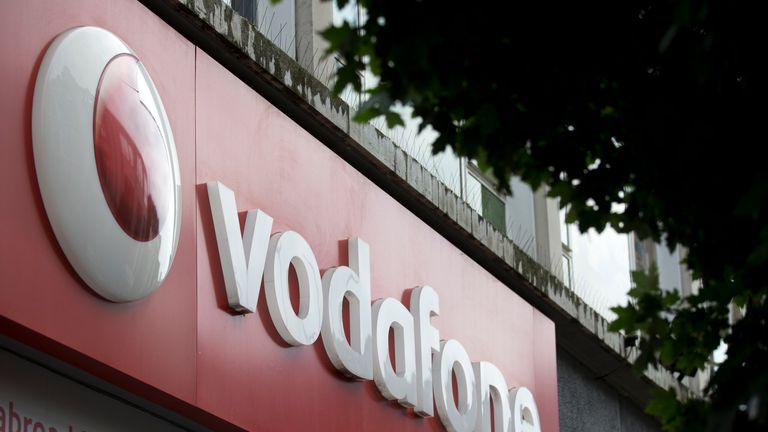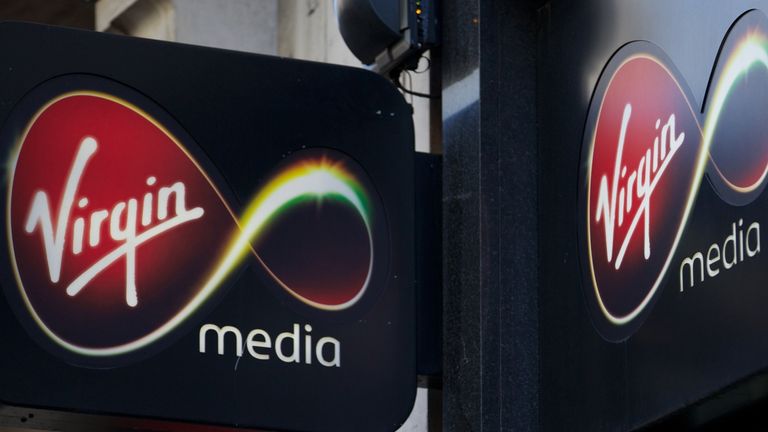Vodafone's cable buy shakes up European landscape
Vodafone's �18.4bn purchase of Liberty Global's European cable arm will cement its position as Germany's largest cable operator.
Friday 11 May 2018 10:16, UK
Chief executives often describe big deals that they have done as "transformational" or "transformative".
In using the latter term to describe his company's , though, the Vodafone chief executive, Vittorio Colao, cannot be accused of hyperbole.
For this genuinely is a transformative deal.
Barely a decade ago, Vodafone was a simple mobile phone company, if such a business can be described as simple.
Following this takeover, it will not only be the world's second-largest mobile network operator after China Mobile, but will also be Europe's biggest provider of broadband and cable services.
The theme of convergence - the coming-together of how people use phone, broadband and television services to communicate and to consume media content - is not especially new.
It was seen, for example, when Sky, the parent of Sky News, entered the broadband market in 2006 and again later that year when the cable company NTL bought mobile operator Virgin Mobile and renamed the merged business Virgin Mobile to become a player in so-called 'quad play' - fixed line, mobile, broadband and pay-TV.
It was seen again when, in 2013, BT launched its TV channel BT Sport.
This deal, though, is a significant landmark in the convergence of the telecoms, media and technology markets in Europe and especially in Germany, Europe's largest economy.
At a stroke, Vodafone has entrenched its position as Germany's largest cable operator and becomes the biggest converged challenger in fixed line and broadband to Deutsche Telekom, the incumbent operator.
It was already market leader in mobile and now also becomes the second-largest provider of pay-TV in the country after Sky Deutschland.
The combination has got Deutsche Telekom seriously rattled. Tim Hoettges, Deutsche Telekom's chief executive, said in February that an expansion of Vodafone in this way would be "totally unacceptable" because it would create a monopoly in some parts of the German market.
Mr Hoettges apologised shortly afterwards, insisting the remark "slipped out", but used exactly the same expression again today as he questioned Vodafone's preparedness to invest in high-speed fibre for rural parts of Germany in the same way his company was.
He told Bloomberg: "I will make sure politicians, the leaders, the authorities who are deciding on this deal…understand the situation which is created by this situation."
Mr Colao hit back, saying he was amused by the remarks, adding: "He wants to keep his dominance as a single nationwide player. Bad news for him - there will now be a second nationwide player."
Some will have sympathy with Mr Hoettges. When Germany opened up its telecoms market, at the beginning of the century, Deutsche Telekom was obliged to separate its cable television arm - just as the old British Telecom was barred for many years from offering cable television services when the UK's fledgling cable industry was getting off the ground in the early 1990s.
Deutsche Telekom would never be allowed to do a deal like this.
Others may observe that there is a certain amount of irony in Mr Hoettges urging regulators to intervene in his own backyard when he is in the process of trying to push through a merger between T-Mobile's US arm - which is 62% owned by Deutsche Telekom - and Sprint, bringing together America's third and fourth largest mobile players respectively, a combination US competition regulators effectively blocked four years ago.
This mega deal poses many questions, many of them in the UK, which was not included in today's deal. In the UK, where Vodafone offers mobile and broadband services but has no cable television business, the company has long been seen as a natural buyer for Virgin Media - also owned by Liberty Global.
Mr Colao, who to date has been happy to provide broadband services by renting lines from BT or and in partnership with CityFibre, insisted today that a takeover of Virgin Media was "not on the agenda right now".
But he added: "You can never say never in life."
Another question is how John Malone, the billionaire chairman of Liberty Global and its majority shareholder, will spend the near €11bn in cash the company will receive from this deal.
He could choose to buy another UK mobile network for Virgin Media, for example, to bolster its position in that market. Mr Colao has previously ruled out offloading Vodafone's UK business to Virgin Media, but a more realistic possibility would be O2, whose Spanish parent - which tried to merge the business with 3 UK before the deal was blocked by the European Commission - could probably be tempted into a deal.
Another potential target, often speculated, could be ITV. Liberty Global raised its stake in the broadcaster to 9.9% in 2015 but, in May last year, Liberty Global's chief executive, Mike Fries, said it was "not interesting" at the price ITV shares were trading.
Shares of ITV have since lost a quarter of their value.
One thing is certain: the next few years are likely to be profitable for investment bankers and lawyers who specialise in advising clients in the telecoms, media and technology space.
There's plenty of activity to come.





